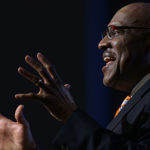Posted: 8/03/07
Sometimes you want to go where
everybody knows your name
By John Hall
Texas Baptist Communications
ELTON—When Randy Rather walks into Tidwell Baptist Church near Greenville, he’s knows everyone—their names, their likes and dislikes and their families. And they know nearly everything about Rather, their pastor.
It’s this atmosphere that makes people feel welcome in small-membership churches, according to pastors who serve in them. Small numbers of people create an environment where people can foster deep relationships with the entire congregation.
| David Keith, pastor of Carlton Baptist Church in Hamilton Association, visits with members of his congregation. People are drawn to smaller churches for the opportunity to have deep relationships with each person in the congregation, leaders of small-membership churches note. |
“I think one of the things that draws people is there’s a chance things can be really personal, whether you’re talking about being in a Bible study, choir or worship,” said Dwayne Wheat, pastor of Berea Baptist Church in Big Spring. “There’s an obvious hole when someone’s missing.”
The same camaraderie exists among small-church pastors, who recently gathered for their annual meeting, supported by the Mary Hill Davis Offering for Texas Missions.
This year, the Texas Baptist Bivocational/Small Church Ministers and Spouses Association elected Rather as president, Baptist General Convention of Texas Congregational Strategist Robert Cepeda as vice president, Rosalind Ray of Fairy Baptist Church in Fairy as second vice president, Ellen Goodson of Memorial Baptist Church in Denton as secretary and Danny Rogers of Field Street Baptist Church in Cleburne as treasurer.
About 70 percent of more than 5,600 congregations affiliated with the Baptist General Convention of Texas average fewer than 100 people each week in Bible study.
Pastors indicated the same factor that draws people to small churches —relationships—keeps them there, as well.
“Pastoring a small church is one of the most rewarding things you can do because you have a relationship with every person,” Rather said.
Small churches are like family businesses, he said. Members know each other, and each has a role. Small churches often require a high degree of commitment from their members, because each person is vital to the congregation’s ministry, he explained.
“A smaller membership church is never a second-class church,” Wheat said. “It holds great opportunities for people who want to find a place to minister, who want a place of service, who want a place to grow.”
David Keith, pastor of Carlton Baptist Church in Hamilton Association, said it’s important to remember members of small churches are trying to serve God like members of larger churches. They sense God moving in their lives and respond. People, many of whom would never attend a larger congregation, come to know Christ as Savior through small churches.
“We’re serving the Lord as effectively as churches with 9,000 or 10,000,” Keith said. “There are needs in rural areas, too.”
Rather echoed Keith’s thoughts. “The ministry of the small church is reaching hearts in a large way, one at a time.”
















We seek to connect God’s story and God’s people around the world. To learn more about God’s story, click here.
Send comments and feedback to Eric Black, our editor. For comments to be published, please specify “letter to the editor.” Maximum length for publication is 300 words.